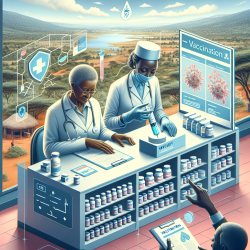The human papillomavirus (HPV) is a significant cause of various cancers globally, including cervical cancer, which is prevalent in sub-Saharan Africa. Despite the availability of effective vaccines, coverage remains low in many regions. A recent study explored the acceptability of pharmacy-based HPV vaccination in Western Kenya, revealing promising insights for expanding vaccine access through innovative delivery models.
The Need for Innovative Vaccine Delivery Models
HPV vaccination coverage among young women in Kenya is notably low, with only 33% of girls under 15 having received the vaccine as of 2020. Traditional methods like school-based programs face challenges such as vaccine hesitancy and misinformation. Therefore, alternative strategies are crucial to reach at-risk populations and improve vaccine uptake.
Pharmacy-Based HPV Vaccination: A Promising Approach
The study conducted in Kisumu County assessed the acceptability of delivering HPV vaccines through private pharmacies. The findings indicated high acceptability among both pharmacy clients and providers. Most clients appreciated the convenience and privacy offered by pharmacies, while providers were confident in their ability to deliver the vaccines effectively.
Key Findings and Implications
- Affective Attitude: An overwhelming majority (96%) of clients liked the idea of receiving HPV vaccines at pharmacies.
- Perceived Effectiveness: Both clients and providers believed that pharmacy-based vaccination could significantly reduce HPV infections.
- Self-Efficacy: Providers felt capable of administering the vaccines and counseling clients effectively.
- Burdens and Ethical Concerns: Few clients perceived any significant burden or ethical issues with receiving vaccines at pharmacies.
Strategies for Practitioners to Enhance HPV Vaccine Delivery
The study highlights several strategies that healthcare practitioners can adopt to improve HPV vaccine delivery:
- Leverage Existing Infrastructure: Utilize the widespread presence of private pharmacies to reach more individuals, especially those who may not access traditional healthcare facilities.
- Enhance Training Programs: Develop comprehensive training for pharmacy staff on vaccine administration and patient counseling to ensure safe and effective delivery.
- Create Public-Private Partnerships: Collaborate with government bodies and pharmaceutical companies to ensure affordable vaccine supply and distribution.
- Pilot Voucher Programs: Consider implementing voucher systems to make vaccines more accessible to low-income populations, ensuring equitable access.
- Pursue Further Research: Conduct additional studies to assess the feasibility, cost-effectiveness, and long-term sustainability of pharmacy-based vaccination models.
The Path Forward: Expanding Access Through Innovation
This research underscores the potential of pharmacy-based models as a viable solution for expanding HPV vaccination coverage in Kenya and similar contexts. By addressing logistical challenges and fostering collaborations across sectors, practitioners can play a pivotal role in reducing the burden of HPV-related diseases.
The insights gained from this study can guide policymakers and healthcare providers in developing scalable models that leverage existing infrastructure while ensuring affordability and accessibility. As we move towards achieving global health targets, innovative approaches like these will be essential in overcoming barriers to vaccine uptake.










